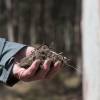
Senate Select Committee inquiry into the Tasmanian Freight Equalisation Scheme
Posted 26 August 2024
Harvesting and selling wood Economic benefits and markets PFT Tree Alliance
The Tasmanian Government welcomes the Senate Select Committee inquiry into the Tasmanian Freight Equalisation Scheme (TFES).
Media Release - 21 August 2024
Eric Abetz, Minister for Business, Industry and Resources
Jane Howlett, Minister for Primary Industries and Water
The Tasmanian Government welcomes the Senate Select Committee inquiry into the Tasmanian Freight Equalisation Scheme (TFES).
Minister for Business, Industry and Resources, and Minister for Transport, Eric Abetz, said reliable, affordable transport across Bass Strait is critical to the Tasmanian economy and community.
"As an island state, Tasmania relies heavily on sea freight and the TFES is vital to placing Tasmanian businesses on a level playing field with the rest of Australia," Minister Abetz said.
"The Scheme has been in place for almost 40 years and has been the subject of a number of inquiries over that period. There is no doubt that Bass Strait shipping has undergone considerable change in that time, with significant increases in service frequency and capacity.
"Over time, successive amendments to the scheme have created some apparent inconsistencies in its scope and operations. For example, King Island and Flinders Island are treated differently, and I recently wrote to Minister King on this matter.
"I am pleased to see that the Select Senate Committee will consider the treatment of the Bass Strait Islands."
Minister for Primary Industries and Water, Jane Howlett, said that Tasmanian farmers and producers would welcome the inquiry, as the scheme had simply not kept up with rising costs.
"Agribusinesses and producers and their representatives like TasFarmers have expressed their strong concerns to me that TFES assistance rates have not changed since 1998 and do not reflect increasing Bass Strait shipping costs," Minister Howlett said.
"This has become increasingly clear during the current feed and fodder shortage due to the drought conditions.
"I have also been advised that accessing the scheme is complex, and some business owners must engage a consultant to help them understand their entitlements and submit claims for assistance," Minister Howlett said.
Minister Abetz, said that the Government welcomed the inquiry as an opportunity for all Tasmanian stakeholders to provide input and to share perspectives on where improvements can be made to the benefit of all users.
"An important part of our 2030 Strong Plan for Tasmania's Future is to back our local communities so they can grow their economies, create jobs and so Tasmanians can work and raise their families and live in our regions.
"It will always be the Tasmanian Liberal Government’s position that Tasmanian businesses should be no worse off under any changes to the Scheme and we call on the Federal Labor Government to commit to a no-worse off guarantee," Minister Abetz said.
Share this Article
Latest Articles
-

20 October 2025
Tasmanian High Soil Carbon Landscapes project
-

17 September 2025
Celebrating excellence at the Tasmanian Timber Awards
-

17 September 2025
Forest Practices Authority Research Update Day
Archives
- ActivAcre hits milestone, calls for more farmers to get on board
- Napier's leading the way in sustainable forestry and carbon-neutral farming
- Sound science needed to assess carbon impacts of timber harvesting
- Newly appointed TFFPN Board of Directors
- Graduate Certificate of Forestry Scholarship
- Forestry Australia Mentoring Program 2025
- Forest Industry Roundtable planning for the long term
- Eagle Management Constraint Period extended
- Successful private native forest management celebrated
- $15 million investment in new ship loader to boost Bell Bay's forestry exports
- Standing with Tasmania's forestry industry: buy local
- TFPA: Tasmanian Freight Equalisation Scheme needs a ground-up review
- AFCA Gala Dinner celebrates industry excellence
- Fire permits now required Statewide
- Forest leaders hone skills in sustainable native regrowth management
- Tasmanian forests and the carbon market: Barriers and opportunities
- What the 2024-25 Tasmanian Budget means for forestry
- Spring is the time for fuel reduction burning
- Primed for Growth: A situation analysis of the Tasmanian Forest and Wood Products Sector
- Audit requirements cut for low-risk plantation projects
- Guidance and support for landowners after damaging winds
- Forestry Australia welcomes further definition of active forest management
- Farm & Forest Mapper Tool highlighted at Rural Youth Tasmania's Young Farmer of the Year competition
- Senate Select Committee inquiry into the Tasmanian Freight Equalisation Scheme
- Timberlink announces new wood composite products brand
- Newly developed protocol a vital tool for safeguarding forestry industry
- Red Hot Tips: Fire management for Tassie farmers
- Bioenergy: Fuelling industries with trees
- Harvesting trees: What you need to know
- Shelterbelts: How are they contributing to farm systems?
- Infill plantings and remnant vegetation: Why biodiversity depends on a thriving understory
- Plantation planning: The key to a successful plantation
- Exciting interactive forestry knowledge hub launched
- $450,000 farm forestry grant recipients revealed


